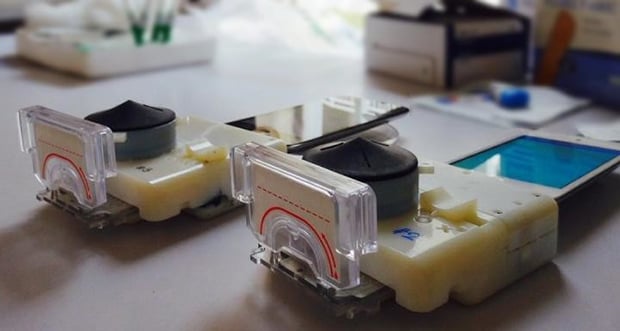Columbia Engineering Researchers Develop Smartphone HIV Test Device With Simple Finger Prick
Smartphones have invaded nearly every aspect of our lives. We use them to email, surf the Internet, text, check our bank statements, play games, and **gasp** actually make phone calls. These personal devices are our computers away from home (or the office) and in the case of developing nations; smartphones are often the only access that people have to the Internet.
That’s what makes this latest research effort from the Columbia University School of Engineering and Applied Science so intriguing. A team of researchers led by Columbia Engineering associate professor Samuel K. Sia have developed a low-cost smartphone dongle that can detect if a person is infected with specific diseases using just a single prick of blood. Right now, the dongle can test for the human immunodeficiency virus (HIV) and syphilis, and can deliver results in just 15 minutes.
"Our work shows that a full laboratory-quality immunoassay can be run on a smartphone accessory," explained Sia. "Coupling microfluidics with recent advances in consumer electronics can make certain lab-based diagnostics accessible to almost any population with access to smartphones. This kind of capability can transform how health care services are delivered around the world."

Columbia University's smartphone dongle tests for HIV and syphilis. (Credit: Samiksha Nayak, Columbia Engineering)
Such a device would do wonders in impoverished countries in Africa, where HIV/AIDS is rampant. Instead of using expensive enzyme-linked immunosorbent assay (ELISA) “wet labs”, which the Columbia researchers say can cost nearly $20,000, the dongle will have a manufacturing cost of just $34 making it easily accessible. In the case of HIV, early intervention is key and such a device would allow “early diagnosis and treatment in pregnant mothers [which] can greatly reduce adverse consequences to both mothers and their babies.”
"By increasing detection of syphilis infections, we might be able to reduce deaths by 10-fold,” Sia added. “And for large-scale screening where the dongle's high sensitivity with few false negatives is critical, we might be able to scale up HIV testing at the community level with immediate antiretroviral therapy that could nearly stop HIV transmissions and approach elimination of this devastating disease."
Not surprisingly, the Bill and Melinda Gates Foundation was instrumental in funding the smartphone dongle. Bill Gates has made it his mission to help fight diseases like HIV, polio, and malaria in developing nations. Most recently, Bill Gates displayed his interest improving sanitation efforts in poor countries by investing in the Omniprocessor, which turns human waste into “delicious drinking water.”

